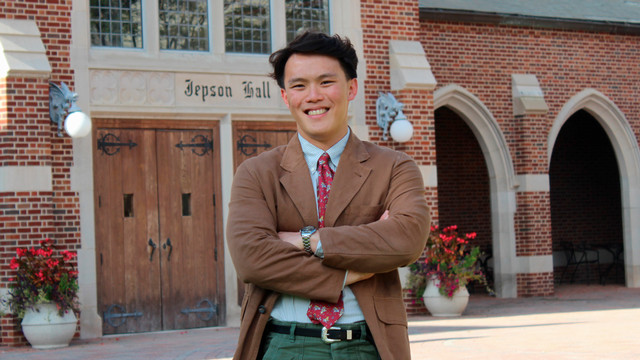The conscription imperative: Making the case for compulsory service
Senior Timothy Khoh would like to see America’s youth come together through shared experiences. To that end, he is writing an honors thesis in which he proposes and justifies a conscription model for use in the U.S.
Khoh knows something about conscription. After moving with his family from Singapore to California when he was 14, he returned to Singapore following his high school graduation in 2020 to complete his compulsory two-year military service. He graduated as a sergeant after eight months of training and then served for 16 months as second-in-command of a six-member army field artillery team that specialized in meteorological systems. Charged with checking weather conditions on the battlefield, his team deployed ahead of the main forces.
“In the moment, a lot of it sucked,” Khoh said with a laugh. “You’re too cold, too hot, too wet, too hungry, too sleep deprived. But now I look back at my service fondly as character building. When you’re in a difficult situation, you tell yourself you can get through today and quit tomorrow. Then you wake up the next day and do it again. By procrastinating on quitting, you never do it. The military taught me discipline, planning skills, and time management that set me up for success at the University of Richmond.”
Khoh enrolled at Richmond after completing his military service. Now the senior leadership studies and philosophy, politics, economics, and law (PPEL) major is using his Jepson School of Leadership Studies honors thesis as a platform to make the moral case for what he calls the conscription imperative.
“What if we compelled recent high school graduates to serve their fellow human beings through civil or military service?” he said. “This could build character, while solving the problem of civic disillusionment and the shortage of employees in hard-to-fill jobs.
“Bringing American youth together through shared service would also address the nation’s political and socio-economic segregation. If everyone is required to serve, you end up working with people from other backgrounds, people you would never have interacted with otherwise. I experienced this during my military service.”
Last year, Khoh asked Dr. Jessica Flanigan, professor of leadership studies and PPEL, to serve as his faculty advisor on his thesis — even though he had not yet had a class with her. She agreed.
“She is famously anti-paternalism and anti-coercion, and my thesis makes paternalistic, coercive arguments,” the senior said. “I wanted an adviser who would push back on my ideas in order for me to build a stronger case. We are both free thinkers and open to the idea we could be wrong.”
Khoh said his thesis will comprise three chapters, with the first focusing on a philosophical question: How can you justify forcing people to do something they don’t want to do? In the second chapter, he will review international conscription models and the justifications countries make for using them.
In the third chapter, he will propose a co-ed form of civil and military conscription for the U.S., including details on the length and types of service and the economic impact. He plans to present his honors thesis at the Jepson Research Symposium in April.
“We have to help strengthen the political body that ensures our right to freedom,” he said. “Conscription is a morally justifiable, good way to do that.”
